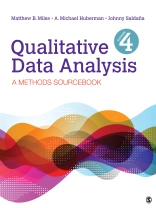‘This comprehensive, practical, user-friendly book provides a wealth of data analysis strategies that are essential for any qualitative research. It is a must-have tool book for moving from data analysis to writing for publication!’
–Guofang Li,
University of British Columbia, Canada
Miles, Huberman, and Saldaña’s
Qualitative Data Analysis: A Methods Sourcebook is the authoritative text for analyzing and displaying qualitative research data. The
Fourth Edition maintains the analytic rigor of previous editions while showcasing a variety of new visual display models for qualitative inquiry. Graphics are added to the now-classic matrix and network illustrations of the original co-authors. Five chapters have been substantially revised, and the appendix’s annotated bibliography includes new titles in research methods. Graduate students and established scholars from all disciplines will find this resource an innovative compendium of ideas for the representation and presentation of qualitative data. As the authors demonstrate, when researchers ‘think display, ‘ their analyses of social life capture the complex and vivid processes of the people and institutions studied.
قائمة المحتويات
List of Displays
Preface to the Fourth Edition
A Note on This Revision
Acknowledgments
About the Authors
PART I. THE SUBSTANTIVE START
Chapter 1. Introduction
The Purpose of This Book
The Nature of This Book
Our Orientation
An Approach to Qualitative Data Analysis
The Nature of Qualitative Data
Our View of Qualitative Data Analysis
Suggestions for Readers
Closure and Transition
Chapter 2. Research Design and Data Management
Introduction
Loose Versus Tight Research Designs
Displaying the Conceptual Framework
Methodologies (Genres) of Qualitative Research
Formulating Research Questions
Defining the Case
Sampling: Bounding the Collection of Data
Instrumentation
Linking Qualitative and Quantitative Data
Data Management Issues Bearing on Analysis
Closure and Transition
Chapter 3. Ethical Issues in Analysis
Introduction
Agreements With Study Participants
Ethical Issues
Ethical Conflicts and Dilemmas
Closure and Transition
Chapter 4. Fundamentals of Qualitative Data Analysis
Introduction
First Cycle Codes and Coding
First Cycle Coding Examples
Coding Craft and Design
Structure and Unity in Code Lists
Definitions of Codes
Second Cycle Coding—Pattern Codes
From Codes to Patterns
Jottings
Analytic Memoing
On Visual Data
Hypotheses, Assertions, and Propositions
Within-Case and Cross-Case Analysis
Closure and Transition
PART II. DISPLAYING THE DATA
Chapter 5. Designing Matrix, Network, and Graphic Displays
Introduction
Display Format Options
Timing of Display Design
Entering Matrix, Network, and Graphic Data
Making Inferences and Drawing Conclusions From Matrix, Network, and Graphic Displays
The Methods Profiles
Closure and Transition
Chapter 6. Methods of Exploring
Introduction
Exploring Field Work in Progress
Exploring Variables
Exploring Reports in Progress
Closure and Transition
Chapter 7. Methods of Describing
Introduction
Describing Participants
Describing Variability
Describing Action
Closure and Transition
Chapter 8. Methods of Ordering
Introduction
Ordering by Time
Ordering Processes
Ordering by Cases
Closure and Transition
Chapter 9. Methods of Explaining
Introduction
Antecedent Conditions, Mediating Variables, and Outcomes
On Explanation and Causation
Explaining Interrelationship
Explaining Change
Explaining Causation
Closure and Transition
Chapter 10. Methods of Predicting
Introduction
Methods of Predicting
Closure and Transition
PART III. MAKING GOOD SENSE
Chapter 11. Drawing and Verifying Conclusions
Introduction
Tactics for Generating Meaning
Tactics for Testing or Confirming Findings
Standards for the Quality of Conclusions
Analytic Documentation
Closure and Transition
Chapter 12. Writing About Qualitative Research
Introduction
Audiences and Effects
Voices and Styles
Writing Examples and Recommendations
Traditional Presentation Modes
Progressive Presentation Modes
On Theses and Dissertations
Closure and Transition
Chapter 13. Closure
Qualitative Analysis at a Glance
Reflections
Final Advice
Appendix: An Annotated Bibliography of Qualitative Research Methods Resources
References
Index
عن المؤلف
Johnny Saldaña is Professor Emeritus from Arizona State University’s (ASU) School of Film, Dance, and Theatre in the Herberger Institute for Design and the Arts, where he taught from 1981 to 2014. He received his BFA in Drama and English Education in 1976, and MFA in Drama Education in 1979 from the University of Texas at Austin.Saldaña is the author of Longitudinal Qualitative Research: Analyzing Change through Time (Alta Mira Press, 2003); Fundamentals of Qualitative Research (Oxford University Press, 2011); Ethnotheatre: Research from Page to Stage (Left Coast Press, 2011); Thinking Qualitatively: Methods of Mind (Sage Publications, 2015); a commissioned title for Routledge’s World Library of Educationalists Series, Writing Qualitatively: The Selected Works of Johnny Saldaña (Routledge, 2018); co-author with the late Matthew B. Miles and A. Michael Huberman for Qualitative Data Analysis: A Methods Sourcebook (4th ed., Sage Publications, 2020); co-author with Matt Omasta for Qualitative Research: Analyzing Life (Sage Publications, 2018); and the editor of Ethnodrama: An Anthology of Reality Theatre (Alta Mira Press, 2005). Previous editions of The Coding Manual for Qualitative Researchers have been translated into Korean, Turkish, and Chinese-Simplified.Saldaña’s methods works have been cited and referenced in more than 16, 000 research studies conducted in over 130 countries in disciplines such as K-12 and higher education, medicine and health care, technology and social media, business and economics, government and social services, the fine arts, the social sciences, human development, and communication. He has published a wide range of research articles in journals such as Research in Drama Education, The Qualitative Report, Multicultural Perspectives, Youth Theatre Journal, Journal of Curriculum and Pedagogy, Teaching Theatre, Research Studies in Music Education, Cultural Studies ? Critical Methodologies, the International Journal of Qualitative Methods, the International Review of Qualitative Research, and Qualitative Inquiry, and has contributed several chapters to research methods handbooks. His most popular journal article, “Blue-Collar Qualitative Research: A Rant” (Qualitative Inquiry, 2014), has been downloaded by over 3, 000 readers, according to Research Gate.Saldaña’s research in qualitative inquiry, data analysis, and performance ethnography has received awards from the American Alliance for Theatre & Education, the National Communication Association-Ethnography Division, the American Educational Research Association’s Qualitative Research Special Interest Group, New York University’s Program in Educational Theatre, the Children’s Theatre Foundation of America, and the ASU Herberger Institute for Design and the Arts.












